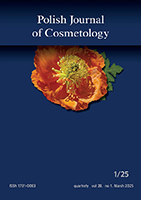search by
Copyright @ Pol J CosmetolNon-specyfic immune response in agingJulita Zdrada Koło Naukowe Katedry i Zakładu Podstawowych Nauk Biomedycznych, Wydział Farmaceutyczny Śląskiego Uniwersytetu Medycznego w Katowicach Summary The immune system is one of the major systems in the human body. It plays a very important role in maintaining homeostasis, however, with aging comes to many of the irreversible changes. The skin is part of the innate immune mechanism. Compact, substances produced and secreted by epidermal cells and cells of the immune system, becoming the guardian of the body are involved in the defense reaction in the first place, to protect against the ingress of pathogens. This involved: keratinocytes, Langerhans cells, T lymphocytes, macrophages, granulocytes, mast cells and endothelial cells. During aging damages the mechanical barriers such as the epithelium of the respiratory, gastrointestinal or skin, which facilitates the penetration of pathogens into the body. Keratinocytes have the ability of antigen presentation and are involved in the inflammatory response, by receiving signals through specific receptors and cytokine secretion. With age there is a reduction in their number due to a reduced proliferative capacity of stem cells of the basal layer of the epidermis. Langerhans cells are dendritic cells of myeloid origin. We present antigen to lymphocytes, initiating inflammation reactions. During aging comes to an impairment of the function of presentation, and reduces the efficiency of the immune response. Changing the quantitative proportions of immune cells, their function is impaired, as well as action. Macrophages and neutrophils have reduced phagocytic ability, and chemotactic cytotoxic due to reduced expression of the enzyme proteins, receptor, and production of reactive oxygen species. The immune system ceases to be effective, however there is a lesion of inflammatory, autoimmune and cancer. Key words: skin, immunology, immune response, aging |




